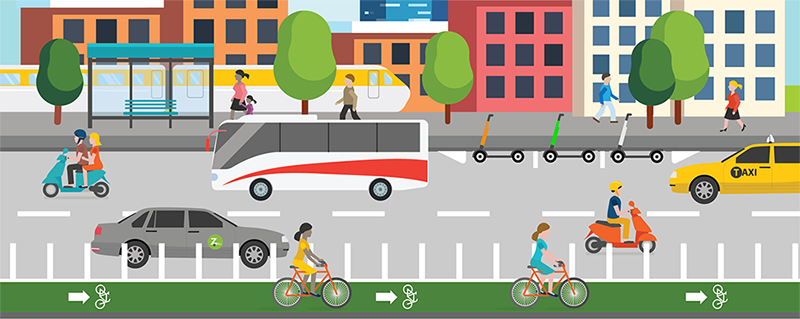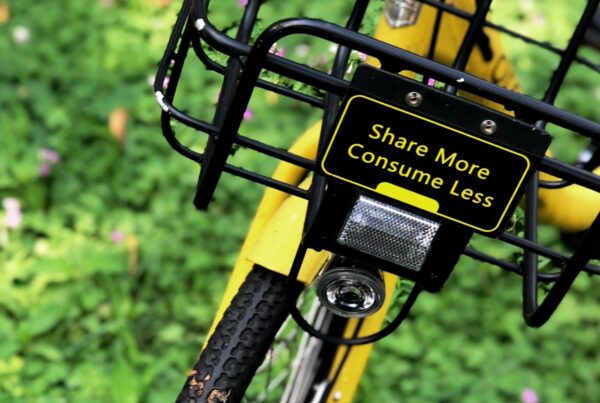Welcome to the Shared-Use Mobility Center’s weekly guide to the most impactful news, thought-provoking articles and innovative technologies that are shaping our transportation future. We believe in sharing information, just like sharing cars, bikes, and scooters, so if there’s anything additional you’d like to see, just drop us a line.
SUMC News and Announcements
 This Friday!
This Friday!
Webinar on Policy Tools to Decarbonize Transportation
How States are Moving the Emissions Needle
Friday, November 20th, at 10:30 am Pacific/12:30 pm Central/1:30 pm Eastern
Global climate change has already had observable effects on the environment, and published evidence points to these changes increasing over time. In other words, we need to act now. The Shared-Use Mobility Center is holding a webinar and workshop focused on state and multi-state tools for reducing greenhouse gas emissions, funding sustainable transportation, and enacting policy change. It features speakers from across the country as well as optional breakout sessions on advancing change in the statehouse, the interaction between state and local government, and funding the efforts needed for change.
Speakers include:

Vicki Arroyo
Executive Director
Georgetown Climate Center

Sam Gregor
Manager, Planning and Regulatory Development Section
California Air Resources Board

Ashwat Narayanan
Executive Director
Our Streets Minneapolis
Mobility Justice
“People who wanted to make their way out of downtown were confronted with dark walls of concrete, steel, and asphalt reaching skyward, severing movement across some of the city’s main thoroughfares.” Read about Chicago Mayor Lori Lightfoot’s decision to raise bridges, close roads and halt transit service to block protesters on The Appeal.
Following the calls for racial justice around the Breonna Taylor and George Floyd protests, several major transit agencies have begun reforming, defunding or restructuring transit policing to tackle discriminatory practices around police brutality. Progressive Railroading calls out five major examples in the US.
There is (finally) substantial research on the relationship between racial segregation, concentrated poverty, and long-term socioeconomic inequalities in the US, so the Brookings Institute maps out a two-pronged strategy to tackle the problems that trap people in poor neighborhoods.
Urban greenery helps fight the dreaded “heat island” effects in cities while providing public green space that can enable cleaner and more active daily mobility, but conservation nonprofit American Forests’ new tool spotlights the lack of “tree equity” facing lower-income, marginalized communities and how to change it.
Ridehailing/Carsharing/Carpooling
The taxi cab industry in New York was hit hard by the pandemic, with ridership plummeting and negative public perception of cabs and COVID-19 still looming. Now, drivers are on the brink of financial ruin with savings and federal unemployment funds drying up—a new proposal, however, lights a beacon of hope to eliminate hundreds of millions in medallion debt.
Lyft wants to bring you dinner, offset losses due to the drop in ridership this year, and take on Uber with a slightly different model that offers restaurant delivery.
Chinese mobility giant Didi Chuxing collaborated with electric vehicle leader BYD to create an EV specifically designed with ridehailing in mind that includes a passenger-friendly display with navigation details, a sliding door for better street entry/exit, and a Level 2 driver assistance system.
Electric carsharing startup Envoy has raised $11 million in Series A funding to expand its shared EV service to more residential and commercial property, including future plans to cover the Pacific Northwest, New York, Miami, Chicago and DC.
Bikesharing and Micromobility
How will driverless cars communicate with cyclists? What does that mean for the safety of pedestrians and two-wheeled travelers? Find out from micromobility expert (and SUMC board member) Emily Warren, including learning about her experience working with Lyft and dockless scooters, on the No Parking Podcast.
Cameras and AI-driven sensors are next on the innovation front for scooters as European electric scooter startup Voi looks to implement these devices on vehicles to detect pedestrians and monitor sidewalk traffic in real time in congested pedestrian areas.
Central Texas-based transportation association Movability has launched a new grant program that will offer businesses up to $5,000 each to boost walking, biking, and scooter use through infrastructure projects. Applications for the first round of grants are due November 30.
Estonian mobility giant Bolt will jumpstart its shared e-scooter and e-bike expansion in 55 more European cities with a €100 million investment, with goals to have 130,000 scooters and bikes available by 2021.
Transit
The new administration will have to hit the ground running with key transportation initiatives from transit-heavy cities like Chicago as metros are banking on federal funds for projects—e.g. the city’s proposed Red Line extension into the South Side—but mobility equity groups like Equiticity are skeptical the status quo will change to address long-running racial disparities.
The Illinois Department of Transportation has awarded a total of $112.5 million to 19 rural and 12 urban transit providers for public transportation improvements and expansions as part of the $45-billion Rebuild Illinois bill passed last year.
Over one year old and going strong, New York’s important launch of the 14th street busway permanently opened up the busy corridor to pedestrians and cyclists while prioritizing buses over car traffic. The results? Faster travel for riders, a less congested street for better throughput, and, equitable use of transit and land to provide affordable mobility.
Urbanize LA gives an update on the 18-mile bus rapid transit line set to connect LA residents in North Hollywood, Burbank, Glendale, and Pasadena, which is set to break ground in 2024, and turn a 2-hour, end-to-end trip into a 66-minute stress-free cruise.
Technology
Sources close to the deal say Uber is in talks with self-driving tech startup Aurora to sell the ridehailing company’s Advanced Technologies Group autonomous vehicle unit, which would be a big departure from its strategy to automate ridehail trips.
Where’s the battery? Renewed interest in structural batteries, which store energy directly in a vehicle’s frame, could bring about lighter vehicles with a significant gain in battery density and range—and no “battery” in sight.
Transportation fare solutions company Masabi and Rochester, NY’s Regional Transit Service have teamed up to offer a complete contactless fare payment integration to tap, pay, and ride through the agency’s smart card or a Go mobile pass in the Transit app, including seamless “fare capping” that corresponds to daily and monthly pass prices.
Check out how your city or neighborhood developed over the course of 200 years with this open-source, interactive map from Google that uses historical fire insurance maps to visualize low-res, changing streetscapes for “almost any U.S. city dating back to 1800.”
Sustainability
Streetsblog USA breaks down the five worst federal decisions from the Trump administration that will have lasting effects on transportation, sustainable mobility, and urban development and calls out how the new administration might reverse things.
Barcelona is planning to expand its car-free “superblock” project to include 21 streets in city’s Eixample district by banning all but residential and essential traffic to create pedestrian plazas at intersections that will include over 16 acres of public green space.
What can planners and city leaders do to ensure green space is resilient to wild fires? Next City looks at the devastating Almeda Fire that rippled through Southwest Oregon in September and how local nonprofits like the Lomakatsi Restoration Project lead the charge to restore native ecosystems and mitigate fire danger.
According to a new request for information (RFI) issued by the National Highway Traffic Safety Administration, the agency is accepting comments on emerging automotive technology that detects driver impairment and prevents the car from starting if detected. This could be the first step in the long road to increase street safety by eliminating drunk driver crashes in the US.
Requests for Proposals, Inquiries, and Information
RFI: Clean Mobility Provider Directory 2.0
Clean Mobility Options Voucher Pilot Program
California
Deadline: December 11, 2020
The Clean Mobility Options Voucher Pilot Program administrator team is conducting a second RFI process to expand and update the existing CMO Clean Mobility Provider Directory. The intended audiences for this RFI are professional mobility operators, vehicle suppliers, infrastructure suppliers, and software providers who are interested in partnering with lead applicants to provide and support zero-emission shared mobility services in eligible communities throughout the State.
RFSOQ: Las Vegas Medical District Automated Circulator and Connected Pedestrian Safety Program
Regional Transportation Commission of Southern Nevada (RTC)
Las Vegas, NV
Deadline: January 5, 2021
Funding Opportunity: Accelerating Clean Transportation Now Program
Massachusetts Clean Energy Center (MassCEC)
Boston, MA
Deadline: January 8, 2021
Open Call: Climate Smart Cities Challenge
Nesta
London, GB
Deadline: January 22, 2021
Did someone forward this to you? Sign up for our newsletter here.



